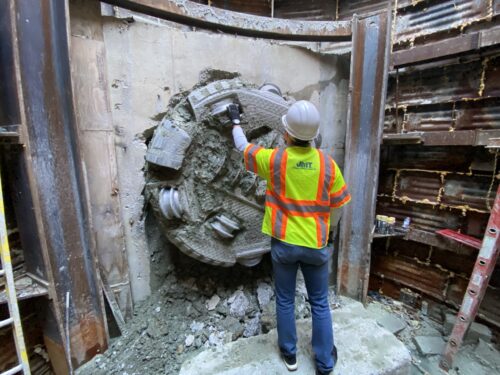JMT Receives Trenchless Technology’s 2023 New Installation Project of the Year Honorable Mention

Among the 2023 Trenchless Technology Rehabilitation Project of the Year Honorable Mentions is the High Level Sewershed Collection System project. Trenchless Technology‘s projects of the year are awarded in two categories – New Installation and Rehabilitation – based on the following criteria: technical advancements, technical complexity, milestones and records, interaction and cooperation, and industry advancement.
This award celebrates our work on the City of Baltimore’s High Level sewershed collection system. JMT designed microtunneling for a new sewer interceptor to eliminate sanitary sewer overflows and basement backups in the High Level sewershed on the west side of Baltimore and adjacent section of Baltimore County. Ultimately, the project improved water quality and sewer system efficiency.
The location and size made the project challenging. Since the pipeline alignment traversed a densely populated neighborhood with highly trafficked roadways, significant maintenance of traffic coordination with the Baltimore City Department of Transportation (DOT) was required to safely and effectively direct traffic around launching and receiving shafts that remained open for months at a time. This project also affected homeowners, businesses, public transit, first responders, and school traffic. JMT worked closely with the DOT to implement traffic barriers, signage, lane closures, and signal phasing to keep traffic flowing.
The alignment corridor included numerous large diameter utilities, such as a 54-inch PCCP water main, along with hundreds of smaller utility crossings. These utilities were among the factors that drove the vertical alignment deep, but many of the utilities had to be supported within the shafts.
A notable part of the project was the inclusion of three curved microtunnel drives totaling 1,400 linear feet. These drives were used in curved roadways and removed short, straight drives. By incorporating curves, we could remove or relocate shafts, thereby reducing the construction footprint and lessening impacts to surrounding communities. Furthermore, both the City and the contractor saved money by eliminating shafts and manhole installations.
The COVID-19 pandemic also presented project challenges, such as material supply shortages. Through a collaborative approach, our team was able to review the implications of the shortages to both schedule and cost. Alternative materials that still met the design intent were assessed and approved for use, where feasible. This approach recovered several months of delay to the construction schedule.
Congratulations to our team members and all other award winners!
Back to All News